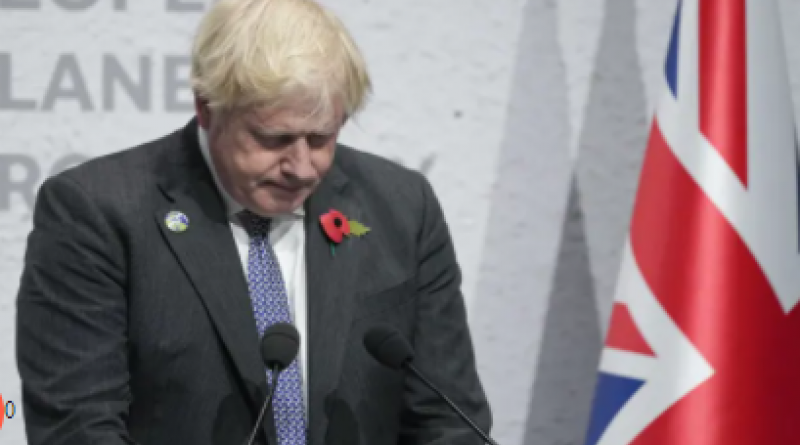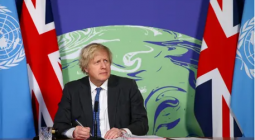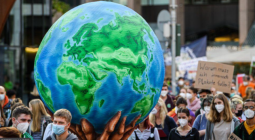Cop26 summit at serious risk of failure, says Boris Johnson

UK PM says climate crisis talks at G20 over weekend only ‘inched forward’
The Cop26 climate summit is at serious risk of failure because countries are still not promising enough to restrict global temperature rises to below 1.5C, Boris Johnson has warned.
In a blunt admission after two days of preliminary talks at the G20 meeting of world leaders, the prime minister conceded little progress had been made – and the conference is not on track to achieve a deal that keeps the goal alive. He put the chances of success as “six out of 10”.
“Currently, let’s be in no doubt, we are not going to hit it and we have to be honest with ourselves,” he said. The commitments being made so far were a “drop in the rapidly warming ocean”.
Johnson will set out the scale of the challenge facing humanity as he opens the Cop26 leaders summit on Monday attended by almost 200 national representatives, including US president Joe Biden and India’s Narendra Modi, but missing key players such as China’s Xi Jinping and Russia’s Vladimir Putin.
He will tell gathered leaders that the world is at “one minute to midnight” in terms of keeping warming below 1.5C, with the UN predicting a rise of 2.7C on the current trajectory – which would lead to catastrophic consequences.
He gave his assessment after meetings with G20 leaders at a gathering in Rome, where he said their progress on climate change had only “inched forward”.
Only 12 of them have pledged to reach net zero emissions “by or around 2050”. Several key nations – China and Saudi Arabia – are only formally pledging to meet that goal by 2060.
The UK is also hoping for tougher pledges from countries for 2030, with experts warning emissions need to be halved by this date, when currently they are on course to rise by 15%. Australia, for example, set out a new 2050 net zero target this week, but did not make a headline commitment for this decade.
As hosts of Cop26, the UK has the significant role of encouraging and negotiating pledges from almost 200 countries, with many developing nations arguing developed nations have a responsibility to do much more as they have already profited from causing historical emissions.
After the leaders meet over the next two days, negotiators will work on texts with the hope of reaching a deal by 12 November.
Johnson may come back to the summit towards the end if it looks like an agreement may be within touching distance.
On the prospects of a deal that keeps to 1.5C, Johnson said: “It’s nip and tuck, it’s touch and go. We could do it, or we could fail by the middle of November.”
Following the G20, there was a sense of disappointment and some trepidation from No 10 about the outcome of the Glasgow summit, although Labour has accused the government of deliberately lowering expectations in order to declare victory if there is only a modestly improved deal at the end.
Speaking at a press conference, Johnson said pledges from countries to lower their emissions needed to be stronger. Experts believe that for 1.5C to have a chance of success, countries need to make substantial and meaningful pledges of reductions by 2030 as well.
He will also ask for promises on phasing out coal, the move to electric vehicles, an end to deforestation, and finance – pledges of money to help developing nations deal with the climate emergency.
“The countries most responsible for historic[al] and present day emissions are not yet doing their fair share of the work,” Johnson said.
“If we are going to prevent Cop26 from being a failure, then that must change and I must be clear, that if Glasgow fails then the whole thing fails. The Paris agreement will have crumpled at the first reckoning.”
At the Paris agreement, made in 2015, world leaders committedto keeping the global temperature rise below 2C or as close to 1.5C as possible. Johnson said that agreement and “the hope that came with it” is currently “just a piece of paper”, which needed to be filled with “granular” pledges from every country.
Global average temperatures have already risen by 1.1C since the Industrial Revolution and only stringent emission cuts will prevent that increase from topping 1.5C.
Johnson said there were no “compelling excuses for our procrastination”, as the world has now seen firsthand the devastation that climate change causes – from heatwaves and droughts to wildfires and hurricanes.
His comments capped a weekend of at times dramatic language on climate change from Johnson, who told reporters travelling with him that he had been converted from previous scepticism following scientific briefings when he entered No 10.
Asked if a commitment in the G20’s end-of-summit communique to achieve carbon neutrality “around” the middle of the century was too vague, Johnson said he had hoped for more.
“I agree,” he said. “And that is a function really of the gap between some colleagues and others.”
Cop26 was going to be tricky, he said: “I’m not going to sugar coat it, I’m not going to pretend it’s other than it is. I think there’s a chance that we can make progress, everybody can see how to do it. It’s a question of will and leadership.”
Asked whether he had shown sufficient leadership given last week’s budget, which froze fuel duty and cut levies for short-haul flights, and cuts to the aid budget, Johnson pointed to the UK’s achievements in cutting emissions, and targets for phasing out petrol and diesel cars.
Ahead of the summit, Downing Street said it would be be contributing a further £1bn over five years to climate finance, taking its commitment from £11.6bn over five years in 2019 to £12.6 billion by 2025.
However, the pledged money will be drawn from the foreign aid budget, which Johnson’s government has slashed this year, and is contingent on the UK economy growing as forecast.
The G20 communique stressed the importance of fulfilling the commitment to provide $100bn (£73bn) to help poor countries adapt to climate change. The UK has acknowledged that Cop26 is not going to meet the hoped-for $100bn pledge this year.
The complex negotiations, which need to resolve more than 130 technical issues as well as the headline issue of “keeping 1.5 alive”, have already run into logistical trouble owing to Covid restrictions.
The main negotiating room has a capacity of 144 because of social distancing. Patricia Espinosa, the executive secretary of the United Nations Framework Convention on Climate Change, said that “as we have 193 parties, that’s literally not enough”.
31 October 2021
The Guardian




